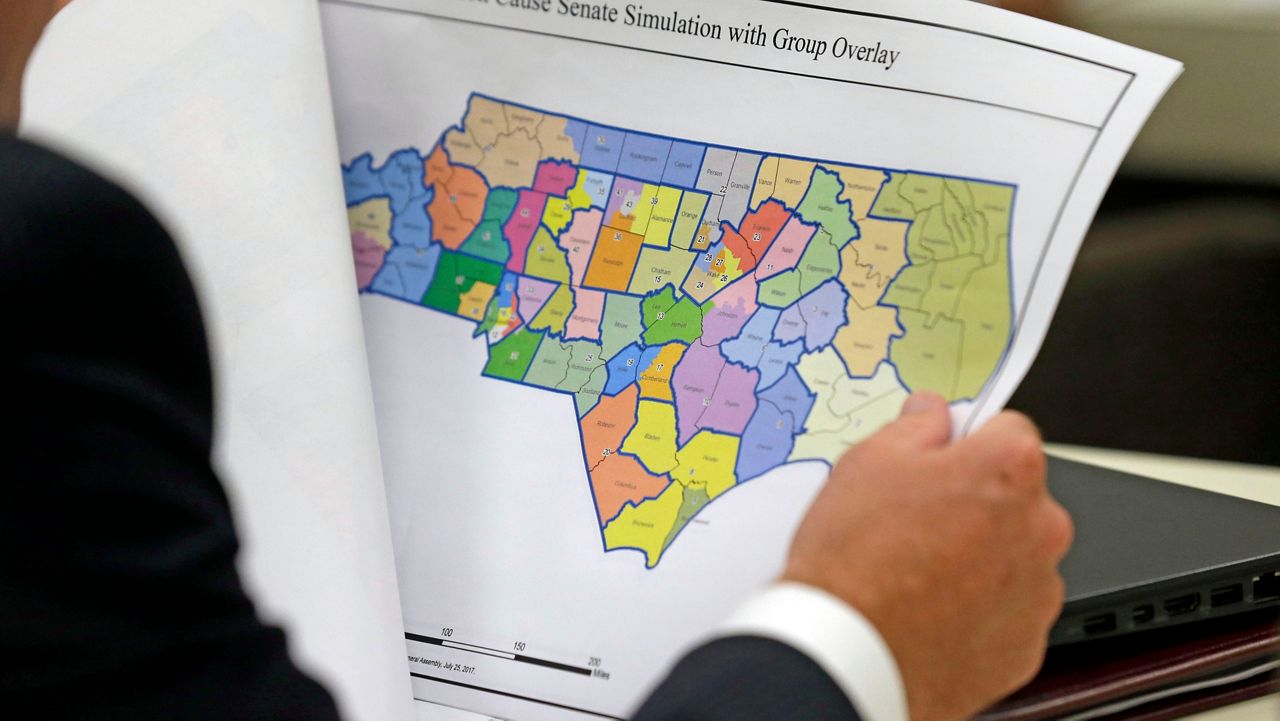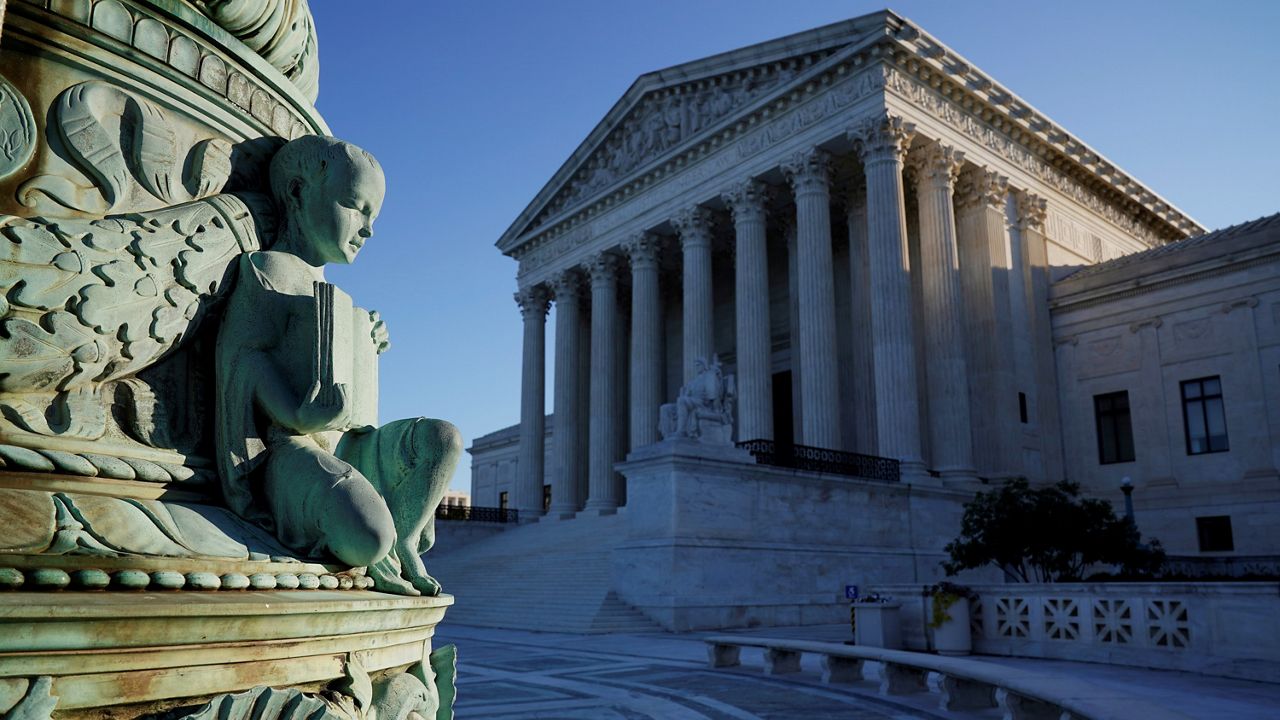When the North Carolina Supreme Court decided to reopen a case on political redistricting, it left a big question-mark hanging in the air. That case has already been heard in the U.S. Supreme Court, so what is the highest court in the country to do with the case now?
That’s what the federal Supreme Court is trying to figure out with Moore v. Harper. Justices heard oral arguments in the case last year, an appeal of the state court’s 2022 decision, and had been expected to issue a ruling this summer. But a new Republican majority took over the state Supreme Court in January and announced they would reopen the case (along with another decision on voter ID).
Attorneys working on both sides of the case gave oral arguments a second time in the North Carolina Supreme Court on May 14. At the same time, they were also preparing new briefs for the justices in Washington D.C., arguing whether or not the U.S. Supreme Court should rule on the appeal at all.
This is a big case, and not just for North Carolina. The main issue here is over redistricting, the redrawing of congressional district lines that comes every 10 years. Democrats accused the Republican-led General Assembly of drawing the lines to favor Republican candidates, called partisan gerrymandering.

The North Carolina Supreme Court agreed and threw out the maps. After a lengthy legal and political process of drawing and redrawing the boundaries, the court imposed its own congressional map for the 2022 election.
The fight over the maps delayed North Carolina’s primary elections last year.
Redistricting experts said the first maps would have led to an estimated 10 Republicans and four Democrats being elected to the U.S. House of Representatives from North Carolina. The maps eventually used in the 2022 elections led to a 7-7 split.
North Carolina is a purple state, with roughtly an even split between voters for Democrats and Republicans. In 2020, the state went for former President Donald Trump, and Democratic Gov. Roy Cooper won reelection.
The appeal to the U.S. Supreme Court opens up a bigger question about court oversight of elections. Republican leaders in the General Assembly argue that the courts should not have any role in federal elections, something called the “independent state legislature theory.”
That theory hinges on one sentence in the United States Constitution. Article 1, Section 4 states: “The times, places and manner of holding elections for senators and representatives shall be prescribed in each state by the legislature.”
Legislative leaders argue that line means they have sole authority over congressional elections, not just in North Carolina but in every state. That could mean the courts have no role in deciding if electoral maps or other laws dealing with federal elections were unconstitutional.
“This is a hugely important case because what it could do is remove all non-legislative control or roles of congressional elections,” said UNC law professor Theodore Shaw.
The U.S. Supreme Court could now avoid getting into those bigger questions completely. They heard oral arguments, but that doesn’t mean they have to rule on them.
They could decide the whole thing is moot now that the case is back open in Raleigh. “The case would go poof and disappear,” Shaw said.
Both the North Carolina Department of Justice and the U.S. Department of Justice argued the U.S. Supreme Court should drop the case.
“The decisions on review are nonfinal, and this Court should therefore dismiss the case for lack of jurisdiction,” wrote Sarah Boyce, with the state Department of Justice.
“On March 14, 2023, the North Carolina Supreme Court heard oral argument on rehearing. The state supreme court has not yet issued a decision, and state law does not require the court to rule on rehearing withinany set timeframe,” she told the U.S. Supreme Court.
The U.S. DOJ made similar arguments, saying the state court’s decision to rehear the case means the decision is not final and the U.S. Supreme Court doesn’t even have jurisdiction at this point.
“The present posture of this case is unusual, and we are not aware of any precedent,” U.S. Solicitor General Elizabeth Prelogar wrote to the court.“The present posture of this case is unusual, and we are not aware of any precedent,” U.S. Solicitor General Elizabeth Prelogar wrote to the court.
It’s not frequent for Common Cause, which sued over the maps, and GOP leaders in the General Assembly to agree, but they both argue the U.S. Supreme Court should make a decision in the case.
“The Court should, if at all possible, decide this question now, rather than on an emergency basis during the 2024 election cycle,” lawyers for Common Cause told the court in a filing Monday.
“The question presented is fully briefed, thoroughly argued, and ripe for decision. This Court is the only forum that can definitively resolve it and provide guidance to state legislatures and state courts across the country,” lawyers for Common Cause said.
Attorneys for legislative leaders argue the decision by the North Carolina Supreme Court was final, even though the court decided to rehear the case.
“Nothing the North Carolina Supreme Court does on rehearing can turn back time and rerun the 2022 congressional election on a map other than that written by the North Carolina court,” attorney David Thompson wrote in a brief filed this week with the U.S. Supreme Court.
No matter what the North Carolina Supreme Court does with this new hearing in the case, the court still tossed out the General Assembly’s map for the 2022 election and had a new one drawn, Thompson argued.
The court, he said, “invalidated the General Assembly’s duly drawn congressional map under an improper understanding of the Elections Clause and in its subsequent stay denial allowed the 2022 congressional election in North Carolina to be conducted under a court-drawn map.”
Lawyers for Rebecca Harper and her co-plaintiffs had a much more succinct message for the court.
“Such that it is inclined to issue a decision here, it should do so only to conclusively—and finally—reject fully the independent state legislature theory,” attorney Abha Khanna wrote in a one-page brief.
But before the U.S. Supreme Court can even decide the issues in the case, the justices need to figure out if they even should take the case.





)


